Music & Music Technology

Pupils describe the music here as “sick” and rave about the music technology opportunities and their bands which they can showcase at the summer festival.
Rocking Star Hill
Even students who do not formally study a musical instrument can benefit greatly from the additional skill set that effectively-delivered music education can offer. These additional soft-skills include building confidence, self-esteem, group-based responsibility, discipline, emotional well-being and spatial reasoning to name a few, and we aim to develop these skills using a variety of teaching methods and facilities.
Music at RIC is broad, practical and fun. In the lower years, students make the most of small class sizes to perform in bands and other ensembles on a range of college instruments. They listen to a vast range of music, from classical to pop to music for games and films and compose their own music in response to what they've heard. With access to iMacs running industry-standard software, they use technology to make music that would not be possible otherwise, from musique concrete to synthpop, Stockhausen to trap.
The focus throughout is on making music real and relevant. Space and support is given to students to explore their own interests and to develop their own approach to making music. During lunchtimes, the music room is a popular destination for curious students looking to work on their own projects, play in college bands, sing in the choir, or just to spend some time listening to music they're interested in. At the end of the year, many students perform at the college festival for parents and visitors.
The college offers a wide variety of facilities including a technology suite, practice room and a live space that facilitates the pursuit of instrumental studies as well as giving students the equipment and opportunity to record their creative works. We also have our own record label that enables us to release student work on major streaming platforms, either as part of vocational coursework or purely as a creative outlet!
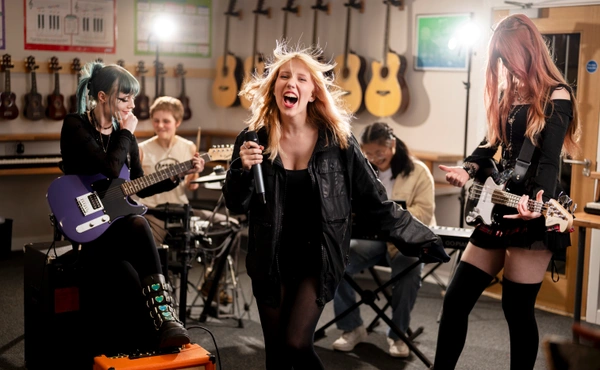
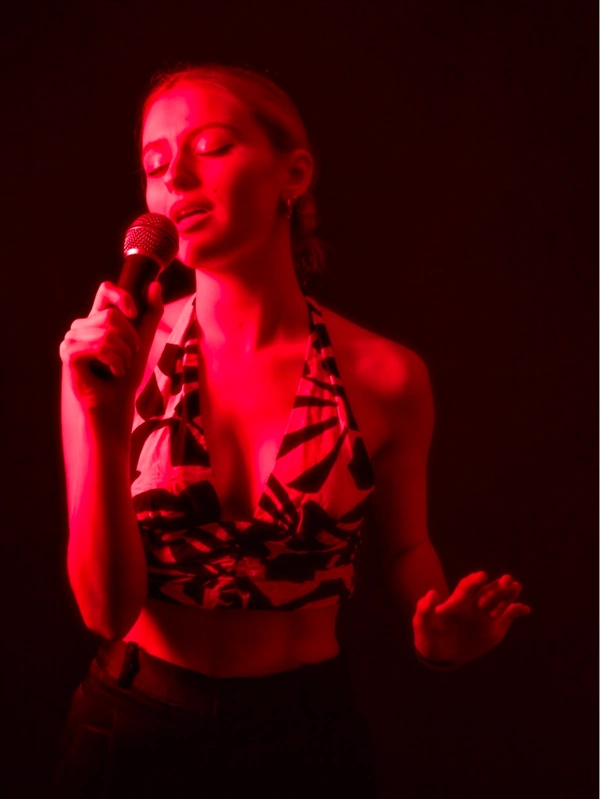
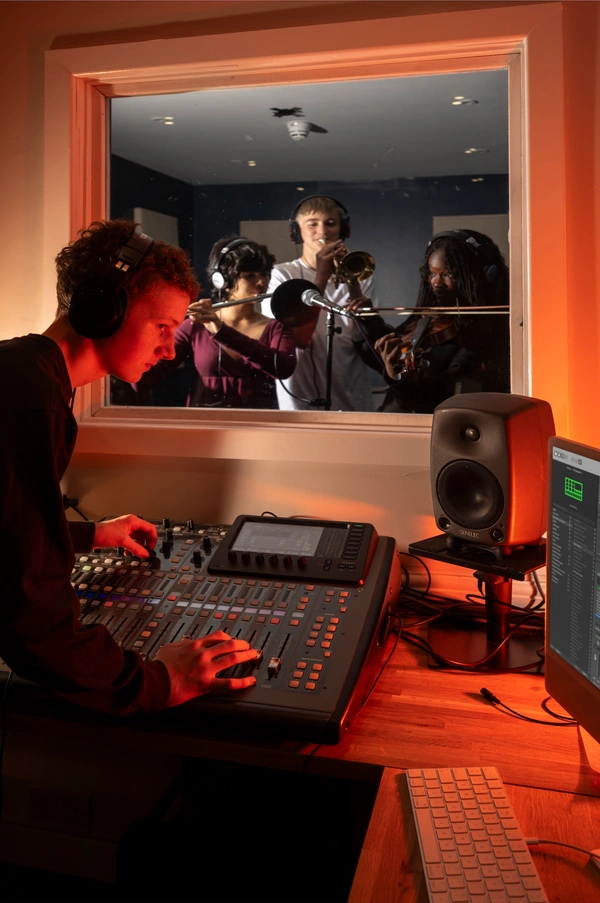
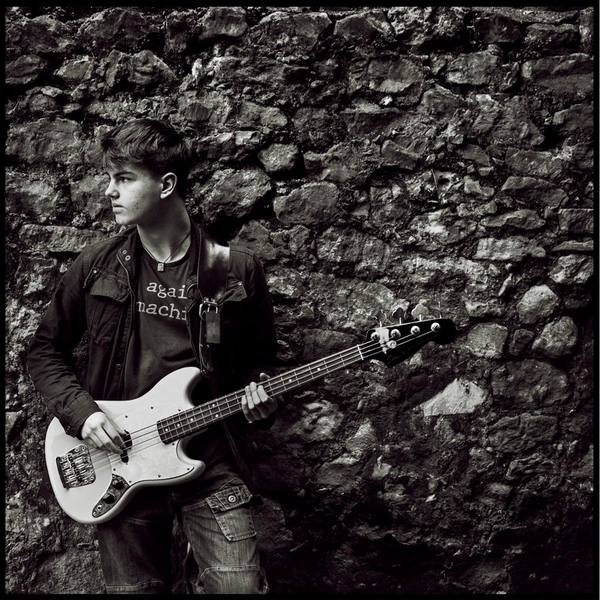
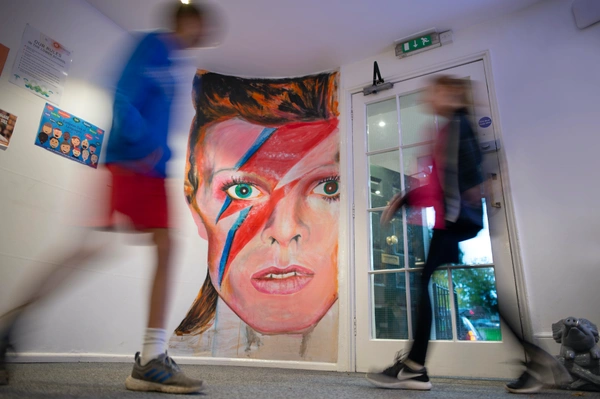
1 / 5
Music classes here are not dry, but involve technology and digital elements of music production. David Bowie (who was born in Kent of course) played in what was once The Good Companions Club, but now called New Road House (and home to the Y7 – Y10s). This claim to fame is celebrated in a piece of wall art.
Traditional and contemporary pathways
We offer a variety of pathways for years 10 to 14 to suit different disciplines, learning styles and focus of study. For years 10 and 11 we offer the more traditional GCSE qualification or the equivalent BTEC Level 2, on a bespoke basis that ensures the best possible outcome for each student based on their musical skill set. Students who are looking to explore classical and contemporary musicology in conjunction with performance and listening-based exams are able to study the GCSE pathway, and students looking for either a performance, production and industry based qualification that is entirely coursework portfolio based opt for the BTEC Level 2.
For years 12 to 14, we offer a similar set of pathways to suit academic study and the budding career musician. We offer the Music Technology A Level for students who focus on the technical aspects of music production, which contains two main coursework components (recording and technology-based composition) and exams covering theoretical knowledge, critical listening and practical skills. We also offer two BTEC Level 3 courses that offer a more holistic approach to music performance, technology and industry curated in such a way that it develops a comprehensive skill set for young musicians looking to go on to work in industry or study music at university level. These two courses are entirely coursework portfolio based and are equivalent to either 1.5 or 3 A Levels in terms of UCAS points, for the one or two year course respectively.
Smaller group numbers mean contact time is plentiful and students have the opportunity to create and score their own compositions in a relaxed environment.



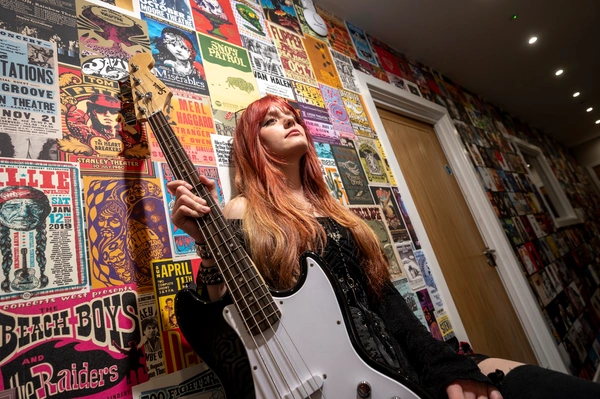
1 / 4
Music Instrument Lessons
We offer a selection of instrument lessons, in addition to the main timetable and open to any student regardless of choosing Music as an option where applicable. These sessions are taught by experienced practitioners who have a wealth of industry and creative experience in a similar vein to our subject teachers. Currently our offering includes:
Vocals
Piano
Guitar
Bass Guitar
Ukulele
More instruments will be added in the near future, including drums and percussion and we are happy to source tuition for a variety of instruments on a case-by-case basis.
We are registered with RSL as an exam centre for graded instrumental study, with students studying a wide range of pieces at various levels all the way from Initial to grade 8. Exams at Grade 6 and above are also worth UCAS points, which are a great addition to a university application and carry additional weight in terms of extra-curricular study.
Exam Specifications
Assessment methods:
100% Coursework (NEA) based qualification.
Structure
Pearson BTEC Level 3 National Foundation Diploma in Music – 540 GLH
There are two learning and teaching modules assessed through four assessment units, with each assessment unit attracting a grade. Learners must complete all mandatory assessment units and achieve at Pass grade or above in at least three assessment units.
Pearson BTEC Level 3 National Extended Diploma in Music – 1080 GLH
There are four learning and teaching modules assessed by 10 assessment units, with each assessment unit attracting a grade. Learners must complete all assessment units and achieve at Pass grade or above in at least five assessment units, including A1, A2, A3 and E13.
Performing as an ensemble
Students rehearse and perform a set of material in a range of genres to a live audience. This is carried out using a range of other musicians with the performance environment in consideration throughout the process.
Creating musical material
Students use Digital Audio Workstations to create a selection of original music that represents their musical knowledge and background. Pieces can be recorded using live or sequenced instruments, along with the use of session musicians where appropriate.
Using musical styles
Students compose a ‘fusion’ style piece that marries two genres of music to artistic effect. This piece is composed using a Digital Audio Workstation, using a range of live or sequenced instruments.
The music industry
Students research and present their predictions of the music industry of the future, focussing on a number of areas including political, economic, social and technological factors that could affect the trajectory of the sector and enable students to consider their future career path.
Personal music profile
Students assemble a portfolio of work with the view to presenting this at future auditions or applications for creative work. This can include promotional material, websites, audio work and other curated media.
Collaborative Music project
Students use material they have composed and recorded over the course of the qualification to participate in a collaborative release project, where they will market and release a collection of work using our digital record label. Student work will be published on Spotify, Apple Music and many other online platforms.
Overlap with other subjects: Drama, Physics, ICT, Business and economics
Assessment method
100% Coursework (NEA) based qualification.
Structure
Pearson BTEC Level 3 National Foundation Diploma in Music – 540 GLH
There are two learning and teaching modules assessed through four assessment units, with each assessment unit attracting a grade. Learners must complete all mandatory assessment units and achieve at Pass grade or above in at least three assessment units.
Pearson BTEC Level 3 National Extended Diploma in Music – 1080 GLH
There are four learning and teaching modules assessed by 10 assessment units, with each assessment unit attracting a grade. Learners must complete all assessment units and achieve at Pass grade or above in at least five assessment units, including A1, A2, A3 and E13.
Studio recording
Students create a recording of either a cover of an existing piece of music or an original composition, using a selection of live instruments. They will not only be in charge of the recording and mixing process from a technical point of view, but from an organisational perspective that includes planning, health and safety, logistics and timings to ensure an efficient professional standard of recording throughout.
Creating Musical material through production
Students use Digital Audio Workstations to create a soundtrack to a chosen section of media. They can use a combination of sequenced, sampled, looped or recorded audio as part of their work, before synchronising the sound to the original media.
Music technology and live events
Students provide technical assistance on a school production. This can include the selection, implementation and operation of a range of live sound equipment including microphones, mixing consoles and sound reinforcement technology.
The music Industry
Students research and present their predictions of the music industry of the future, focussing on a number of areas including political, economic, social and technological factors that could affect the trajectory of the sector and enable students to consider their future career path.
Personal music profile
Students assemble a portfolio of work with the view to presenting this at future auditions or applications for creative work. This can include promotional material, websites, audio work and other curated media.
Collabrative music project
Students use material they have composed and recorded over the course of the qualification to participate in a collaborative release project, where they will market and release a collection of work using our digital record label. Student work will be published on Spotify, Apple Music and many other online platforms.
Overlap with other subjects: Drama, Physics, ICT, Business and economics
Staff
Music teaching staff at RIC offer a unique insight into the music industry, as well as perspectives offered in traditional and contemporary musical foci in addition to curriculum-based studies. Our teaching staff are also practising professional musicians who inspire students and bring both relevance and gravitas to the offering at the college, with past professional experience including:
Tours of the UK, Europe, America and Canada
Festival appearances including Glastonbury, Guilfest and SummerDays (Arbon, Switzerland)
Songwriting and recording credits in a variety of genres and fields including music for film and computer games as well as more traditional outputs such as physical and digital release
Visiting workshops, extra curricular activities and trips
At RIC we invite a range of practitioners onsite to deliver workshops and provide additional curricular enrichment. One of the more recent visits came from ‘Beat Goes On’, the brainchild of Ollie Tumner who has previous credits including CBBC and Stomp the Musical. Students have attended guided tours and experience-based days at universities that focus on the creative arts, the most recent of which was a day using the recording facilities at Canterbury Christ Church University.
The department is currently planning a range of exciting trips to gigs, musical theatre shows and concerts both in the UK and abroad. Past highlights include music exhibitions at the O2, performance training on the Balinese gamelan, the BBC Philharmonic Orchestra at the Festival Hall in a programme of Electronica introduced by Jarvis Cocker, the Olivier Award winning version of Puccini’s La Boheme at The King’s Head in Islington, Terry Gilliam’s reimagining of Berlioz’s Faust at the ENO, Alice in Wonderland at the ROH and West End musicals such as Wicked, Six and Everybody's Talking About Jamie.
Music beyond RIC
Alumni have won places to study Music at Liverpool University, ICMP, Leeds College of Music, BIMM, Goldsmiths, Canterbury Christ Church University and The Academy of Contemporary Music.

RIC's Musical Gates
RIC is home to a unique musical instrument. A five-ton set of stainless steel gates and railings on a busy road in the Kent cathedral city of Rochester is actually a unique musical instrument.
This project by musician, sound sculptor and Björk collaborator Henry Dagg, this marvel of ingenuity and Victorian-style engineering took more than four years to build. Standing almost four metres tall and 8.5 metres wide across the entrance to Rochester Independent College, the imposing structure is designed to make music with vibraphone bars, tubular bells and organ pipe-like tubes with resonating strings that can be plucked, struck or bowed. “It has a pitch span of six octaves, so most of the orchestral range, and each section has its own very distinctive sound quality,” Click here for more information.
Henry, a former BBC sound engineer and award-winning musical saw player who has worked with acts including Bob Geldof, Keane and The Cranberries, is well known for his unique, hand-built musical creations.
His magnificent two-ton Sharpsichord, a 46-string mechanical pin-barrel harp, accompanied Björk on her 2011 Biophilia album and tour. And he famously reduced Prince Charles and the Duchess of Cornwall to tears of laughter with a performance on his 'Catastrophony' cat organ at a royal garden party
He also built a glockenspiel-style musical garden fence outside his Kent home which was officially opened with a performance by virtuoso classical percussionist Dame Evelyn Glennie broadcast.
Soon afterwards, Rochester Independent College commissioned Henry to build a suite of musical gates and railings for the school's main entrance on Star Hill.
Making music add up
Maths and Music involve similar mental gymnastics. Eminent mathematician Carol Vorderman was a backing singer for Liz Kershaw’s band “Dawn Chorus & The Blue Tits” who were signed by Stiff Records in 1984. There were hints of Fibonacci numbers and the golden ratio in Bach’s music and he was Einstein’s favourite composer.
Jazz pianist and Oxford University Maths graduate Rob Dimbleby teaches piano and Maths at RIC. Recent gigs include Ronnie Scott’s and SoFar sounds with 7piece neo-soul group Pangolin and a European tour with NME top 100 band Patawawa.
Rob says: “For the very brightest students I have enjoyed teaching them some university level maths. In Further Maths at RIC I also like to drop in a short question taken from a past Oxford MAT paper.”
In the recent year 7 taster day Rob taught an interdisciplinary mathematical music class where students were encouraged to listen by numbers and combine the study of fractions with that of octaves. And encouraged to do something fun with ukuleles.
It was my 16th birthday - my mom and dad gave me my Goya classical guitar that day. I sat down, wrote this song, and I just knew that that was the only thing I could ever really do - write songs and sing them to people.